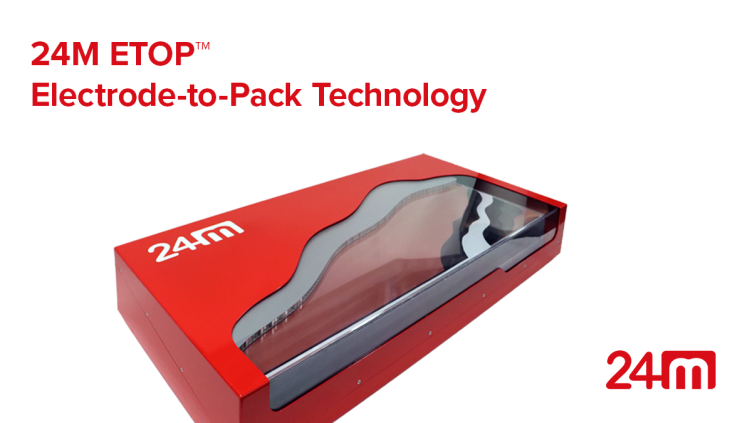
At the on-going 2023 Japan Mobility Show, battery firm 24M is showcasing its transformative and streamlined battery pack technology - the 'Electrode-to-Pack' (ETOP) system - that features electrodes packaged directly into the battery pack, thereby eliminating the need for individual cells and modules.
Traditionally, battery manufacturers and energy storage integrators build battery packs and modules from individual cells. However, current lithium-ion battery cells have a large fraction of inactive, non-charge-carrying materials such as supporting metals and plastics within a cell's casing. These inactive materials reduce module and energy density and add unnecessary expense and waste, the company says.
Enabled by the 24M Unit Cell design, the 24M 'ETOP' technology eliminates unnecessary cell materials within the battery pack and allows manufacturers to achieve the highest energy density available at the pack level while cutting costs, it adds.
"24M 'ETOP' will be a game-changer for electric mobility and energy storage systems because it delivers unmatched energy density," said Naoki Ota, 24M President and CEO. "This innovative new battery technology is enabled by our Unit Cell technology and is reflective of what's yet to come from 24M."
RELATED: 24M bags $3.2 million US Federal funding to develop Sodium-metal EV batteries
He further added, "We are moving beyond our core technology — the 24M 'SemiSolid' manufacturing platform — into a company with a revolutionary technology set that will deliver truly transformative solutions for a better energy future."
According to the technology developer, the ETOP system delivers dramatic improvements in key areas such as electrode packing efficiency, pack design flexibility, overall pack cost, range and cycle life, and safety.
It is to be noted that 24M has raised approximately $400 million in private capital from strategic and financial investors, including Volkswagen, FREYR, Kyocera, Itochu, GPSC and Fujifilm since its founding in 2010.
The company claims to re-invent today's battery manufacturing methods and product design, thereby solving the critical, decades-old challenges associated with the energy storage products and technologies and reduce their high cost while improving their performance, safety and recyclability.
